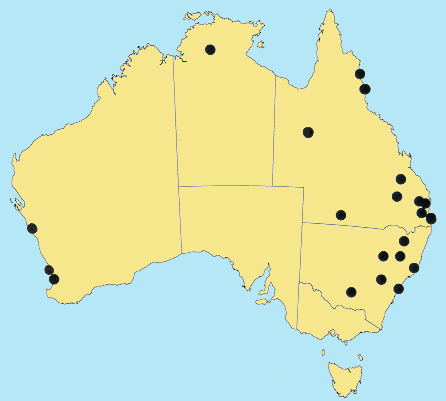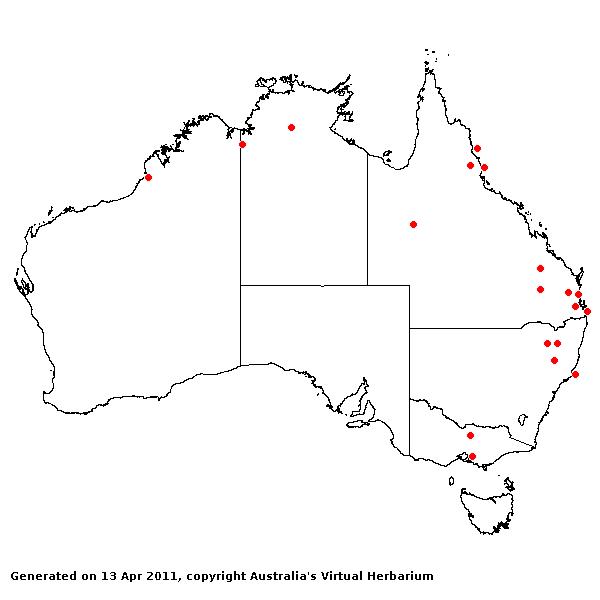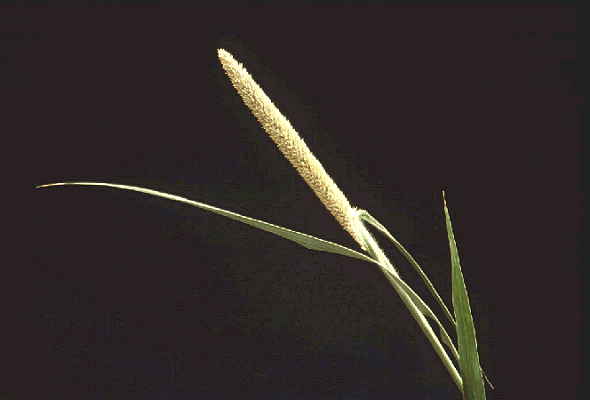Cenchrus americanus* (L.) Morrone. Ann.
Bot. 106:127 (2010).
Classification. (GPWG 2001) : Subfamily
Panicoideae. Paniceae.
Basionym and/or
Replacement Name: Panicum americanum L., Sp. Pl. 1: 56 (1753).
Type of Basionym or
Protologue Information: LT: Hermann, Fl. Zeyl. 44, Sri Lanka (BM).
LT designated (as holotype) by Rauschert, Feddes Repert. 83(9–10): 662
(1973).
Recent synonyms: P. typhoides, P. glaucum L., Sp. Pl. 1: 56 (1753).
Key references
(books and floras): [1810]. R.Brown, Prodromus (195), [1952]
C.A.Gardner, Flora of Western Australia 1 Gramineae (278 as P.
typhoides), [2002] D.Sharp & B.K.Simon, AusGrass, Grasses of
Australia as Pennisetum glaucum, [2008] S.W.L.Jacobs, R.D.B.Walley & D.J.B.Wheeler, Grasses
of New South Wales (333) as Pennisetum glaucum.
Illustrations:
[2008] S.W.L.Jacobs, R.D.B.Whalley & D.J.B.Wheeler, Grasses of New South
Wales, 4th edn (333) as Pennisetum glaucum.
Habit. Annual.
Rhizomes absent. Stolons absent. Culms erect, stature robust to moderate,
50–300 cm tall. Mid-culm internodes solid or spongy. Mid-culm nodes bearded.
Leaf-sheath auricles absent. Ligule a fringed membrane or a fringe of hairs,
2–5 mm long. Leaf-blades linear, 15–100 cm long, 7–70 mm wide.
Inflorescence.
Inflorescence solid, a panicle. Panicle linear or elliptic, 4–200 cm long,
0.8–5.5 cm wide.
Spikelets.
Spikelets pedicelled, 1–9 in the cluster. Involucre composed of bristles.
Fertile spikelets 2-flowered, the lower floret barren (rarely male), the upper
fertile, comprising 1 basal sterile florets, comprising 1 fertile floret(s),
without rachilla extension, obovate, terete or dorsally compressed, 3–6 mm
long.
Glumes. Glumes
thinner than fertile lemma. Upper glume oblong, 0.5–2 mm long, membranous,
without keels, 0–3 -nerved. Florets. Basal sterile florets 1, male or
barren, with palea or without significant palea. Lemma of lower sterile floret
50–75 % of length of spikelet, chartaceous, 5–7 -nerved, muticous or mucronate.
Fertile lemma 1.4–4 mm
long, without keel, 5–7(–9) -nerved. Lodicules absent or vestigial. Anthers 3.
Grain 2–5.5 mm long.
Continental
Distribution: Europe, Africa, Temperate Asia, Tropical Asia, Australasia,
North America, and South America.
Australian
Distribution: Western Australia, Northern Territory, Queensland, New South
Wales.
Western Australia:
Drummond. Northern Territory: Darwin & Gulf. Queensland:
Burke, Burnett, Cook, Leichhardt, Moreton, Wide Bay. New South Wales:
North Coast, Central Coast, Northern Tablelands, North-Western Slopes, South-Western
Slopes.
Notes.
Introduced. A crop species that occasionally escapes cultivation and persists
in mesic areas. Flowers mostly Mar.-July but sporadically throughout the year.




